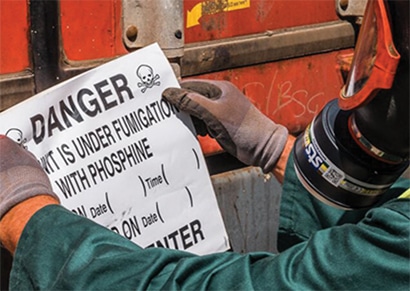
Metallic phosphides are widely used as a biocide, to protect goods and prevent the spread of invasive pest species during transit of those goods between countries.
In 2015, during the re-registration for metal phosphide use as a plant protection product, it was deemed safe to perform fumigations providing a five-metre exclusion zone was applied to the active fumigation to protect workers, operators and members of the public from toxic gasses.
This mandatory exclusion zone meant that the practice of ‘’in-transit fumigation’ came under closer scrutiny and, following talks with RAMPS UK, has now been deemed unsafe by HSE.
In-transit fumigations take place predominantly in shipping containers while they are being transported. This includes the proportion of the container journey by road.
Since the driver of a lorry transporting a fumigated shipping container sits well within the exclusion zone, the HSE was asked to comment on whether this remained a safe practice.
RAMPS UK is urging fumigators, hauliers and exporters to eliminate the proportion of the fumigation which involves road transport and to explore options, where possible, of fumigating either at source, at port or at the commodity’s destination.
In the meantime RAMPS UK said it will continue to hold discussion with HSE and the approval holders Detia Degesch to explore the possibility of amending the current authorisations so that an assessment can be conducted specific to this use and, if it can be demonstrated that it can be undertaken safely, to amend the authorisation conditions so that that transporting fumigated containers by road can be permitted
Published: 23 June 2020

